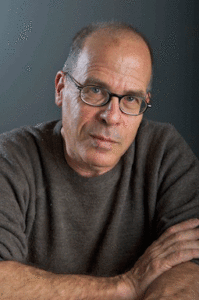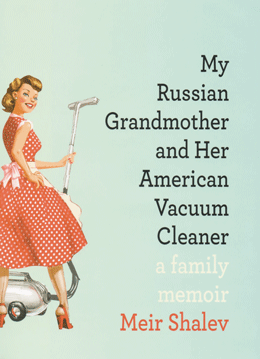By MORDECAI SPECKTOR
Celebrated Israeli author Meir Shalev is on the phone, speaking from his home in a small town in the Jezreel Valley — near Nahalal, the village where he was raised.
“I run away from Jerusalem from time to time,” he comments, about his retreat in the north of the Jewish state.
Shalev’s latest book in an American edition is a memoir, My Russian Grandmother and Her American Vacuum Cleaner (Schocken). It’s an affectionate and truly funny look back at his family, beginning with his Grandma Tonia — whom some regard as “crazy.”
“She was different. She was distinctive,” writes Shalev. “She was what we call a ‘character.’ She was not an easy person, and that’s putting it mildly. But crazy? No. However, as in other matters, not everyone agrees with me. Other people have different opinions, both in the village and in the family.”
The eponymous grandmother shares the book’s title with a General Electric canister “sweeper,” which was a gift from the author’s Uncle Yeshayahu, a “double traitor” who deserted both Zionism and socialism for business success in Los Angeles — “exploiting the hard work of the proletariat,” in the eyes of his left-wing Israeli family.

Shalev will visit the States to promote his new memoir, and his tour will include a Nov. 9 stop at the Sabes JCC. His appearance here is part of both the Culture Blvd. – Israeli Author Series and the 2011 Twin Cities Jewish Book Fair, and is co-sponsored by the St. Paul JCC, the Sabes JCC and the Israel Center of the Minneapolis Jewish Federation.
One of Israel’s most popular and beloved authors, Shalev has achieved global fame through his bestselling novels, including A Pigeon and a Boy and The Blue Mountain, which have been translated into many languages.
Shalev’s conversation with the American Jewish World took place during Sukkot, so I asked him about the passage in his memoir where he describes his father’s conflict with his new in-laws, especially with Grandma Tonia. The author’s parents flee Nahalal for Tiberias, and then settle at Kibbutz Ginosar.
“We stayed at Ginosar for four years, and my very first memories come from there,” Shalev writes. “We lived on the shores of the Sea of Galilee in a lean-to with walls of hanging cloth and fruit crates for storage and a roof made of palm fronds.”
The famed Israeli author was residing in a sukka?
“Yah, I did. I was living in a sukka for the first four years of my life,” Shalev responded.
The author mentioned that an “ultra-Orthodox rabbi” lives on the first floor of his apartment house in Jerusalem, and builds a sukka in the parking area. The Shalevs, however, mark Sukkot, and Pesach, by going four-wheeling and camping in the desert.
When the rabbi tells Shalev that he should observe Sukkot in a sukka, in the traditional Jewish way, the author responds that living in the desert is “more like the biblical Children of Israel.”
Shalev continued, “And then I tell him that I lived in a sukka four years, which is more than you will live all of your life, if you collect all the Sukkot days.”
As the title of his memoir suggests, Shalev’s maternal grandmother had a thing about cleaning. Grandma Tonia’s compulsive cleaning eventually provokes a rupture with her younger daughter, Batsheva, who was serving with the Nahal Fighting Pioneer Youth.
When the grandmother intercedes with Batsheva’s superior to have her daughter released from her unit and return to the farmstead, the author’s young aunt rebels and signs a waiver so she can continue to serve.
“Her mother and father were furious with her beyond reason,” Shalev recalls in the memoir. “She told me that in their extreme anger they very nearly came to blows with her, but it did not help; she preferred to stay in the army. She said that it was pleasant and interesting for her, and I allow myself to imagine that no master sergeant in the IDF could ever have been as stringent about cleaning as was her own mother.”
It should be mentioned that Evan Fallenberg does a wonderful job of translating Shalev’s felicitous Hebrew prose into English.
During the interview, Shalev mentioned that another of his books, Beginnings: Reflections on the Bible’s Intriguing Firsts (Harmony), recently came out in a U.S. edition.
“I’m talking about different occurrences of first times [in the Bible] — like the first laugh, the first love, the first kiss, the first king, the first prophet,” Shalev explained about Beginnings. “I always start with the ‘first,’ and allow myself to elaborate and then go on to other episodes. It’s kind of a secular, literary reading of the Bible; because I’m not a religious person, but I really like the biblical stories since a very early age — and I was lucky to grow up in the house of a Bible scholar, my father. So, he made the Bible very interesting for us, for his children.”
Shalev’s father was the poet and author Yitzchak Shalev. The literary family also includes Meir Shalev’s cousin, Zeruya Shalev, a bestselling Israeli author.
As these Israeli author interviews usually go, Middle East politics lifts its ungainly head. Shalev talked with the Jewish World on the day before the release of Gilad Shalit, who had been held in cruel captivity by Hamas forces in Gaza for more than five years.
“Most of the people support it,” Shalit said, regarding the deal to release Shalit in exchange for more than a thousand Palestinian prisoners. He allowed that “a very vocal and aggressive group of people,” the relatives of those killed in Palestinian terrorist attacks, was weighing in against the deal.
Shalev, who maintains the tradition of the politically engaged Israeli author, also said that the deal to secure Shalit’s release could have happened several years ago.
“I was one of the supporters of this kind of negotiation from the beginning. I am in contact with the Shalit family, and I was speaking in some of the demonstrations, and I was on television many times, speaking on behalf of his release.”
Shalev also writes a column in the Israeli daily Yediot Achronot, and advocated for the government to conclude a deal for Shalit’s release.
The Israeli author served in the IDF during the 1967 Six-Day War and was seriously wounded. I asked him about a column he wrote for the Los Angeles Times, marking the 40th anniversary of the victory in that war and the beginning of Israel’s ongoing occupation of the Palestinian territories.
Shalev wrote, in 2007: “Forty years of deceitful, villainous dealing in the occupied territories have caused corruption to seep into our own politics and society. Forty years, and we must come to terms with the fact that Israel cannot cultivate democracy at home and apartheid in the backyard.”
I suggested that American Jews kind of go nuts when someone uses the word “apartheid” in relation to Israel.
“Yes, but this is the situation in the West Bank, the occupied territories,” replied Shalev. “If you have different highways for Palestinians and for Jews, and if you have a different law for Palestinians and Jews, and if you have roadblocks for Palestinians and you don’t have roadblocks for Jews, then this is some kind of discrimination.”
Shalev knows that the occupation is “very bad” for the Palestinians living under Israeli rule; but he said that his objections mainly are “Israeli-focused.”
“I think it is very bad for Israelis … I am a Zionist, I am worried about the State of Israel, and I think this occupation is a real threat to the future of Israel; because, from 1967 and on, most of the energy of Israel and the resources of Israel, and the time and blood and money of Israel, are invested in the occupied territories.”
***
The Culture Blvd. – Israeli Author Series continues with an appearance by Meir Shalev 7 p.m. Wednesday, Nov. 9 at the Sabes JCC, 4330 S. Cedar Lake Rd., St. Louis Park. Tickets are $12, or $10 for students, seniors and JCC members. Light refreshments and book signing will follow the presentation. For tickets, call 952-381-3499 or e-mail: tickets@sabesjcc.org.
This event also is part of the 2011 Twin Cities Jewish Book Fair.
(American Jewish World, 10.28.11)






















Comments 0